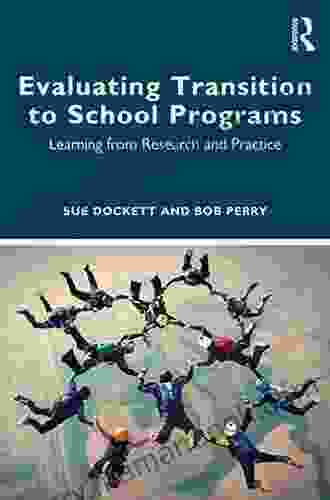Evaluating Transition to School Programs: A Comprehensive Guide

Transitioning from preschool or kindergarten to elementary school is a significant milestone in a child's life. It is a time of major changes and adjustments, both for children and their families. Transition to school programs are designed to support children in making this transition smoothly and successfully. However, it is important to evaluate these programs to ensure that they are effective and meeting the needs of children.
Evaluation Methods
There are a variety of methods that can be used to evaluate transition to school programs. These methods can be divided into two main categories: quantitative and qualitative.
5 out of 5
| Language | : | German |
| File size | : | 1542 KB |
| Text-to-Speech | : | Enabled |
| Enhanced typesetting | : | Enabled |
| Print length | : | 86 pages |
| Screen Reader | : | Supported |
Quantitative Methods
Quantitative methods involve collecting numerical data to measure the effectiveness of a program. This data can be used to assess changes in children's development and school readiness, as well as the impact of the program on other outcomes, such as attendance and behavior. Common quantitative methods include:
- Pre- and post-tests: These tests are administered to children before and after they participate in a transition to school program. The results can be used to measure changes in children's knowledge, skills, and attitudes.
- Observational studies: These studies involve observing children in a variety of settings, such as the classroom and the playground. The data can be used to assess children's social, emotional, and cognitive development.
- Longitudinal studies: These studies follow children over a period of time to track their progress in school and beyond. The data can be used to identify factors that contribute to success and to evaluate the long-term impact of transition to school programs.
Qualitative Methods
Qualitative methods involve collecting non-numerical data to gain a deeper understanding of the effectiveness of a program. This data can be used to explore children's experiences and perspectives on the transition to school, as well as the perspectives of parents and teachers. Common qualitative methods include:
- Interviews: These interviews can be conducted with children, parents, and teachers to gather their insights on the transition to school program.
- Focus groups: These groups bring together a small number of participants to discuss a specific topic or issue related to the transition to school program.
- Document analysis: This method involves analyzing documents, such as program plans, curriculum materials, and assessment data, to gain a better understanding of the program.
Evaluation Criteria
When evaluating transition to school programs, it is important to consider a variety of criteria, including:
- Program components: The components of a transition to school program should be aligned with the needs of children and their families. This includes the length of the program, the type of activities that are offered, and the staff qualifications.
- Program implementation: The program should be implemented with fidelity to the original design. This means that the program is delivered as intended and that the activities are engaging and developmentally appropriate.
- Program outcomes: The program should be evaluated based on its outcomes. This includes changes in children's development and school readiness, as well as the impact of the program on other outcomes, such as attendance and behavior.
Challenges in Evaluation
There are a number of challenges associated with evaluating transition to school programs. These challenges include:
- Attrition: Children and families may drop out of transition to school programs before they can be evaluated. This can make it difficult to assess the long-term impact of the program.
- Measurement: It can be difficult to measure changes in children's development and school readiness. This is because these changes are often gradual and may not be immediately apparent.
- Contextual factors: The effectiveness of a transition to school program may be influenced by a variety of contextual factors, such as the child's family background, the school environment, and the community. It is important to take these factors into account when evaluating the program.
Evaluating transition to school programs is an important way to ensure that these programs are effective and meeting the needs of children. By using a variety of evaluation methods and considering a variety of criteria, it is possible to gain a comprehensive understanding of the program's impact. This information can be used to improve the program and to ensure that children are getting the support they need to make a successful transition to school.
5 out of 5
| Language | : | German |
| File size | : | 1542 KB |
| Text-to-Speech | : | Enabled |
| Enhanced typesetting | : | Enabled |
| Print length | : | 86 pages |
| Screen Reader | : | Supported |
Do you want to contribute by writing guest posts on this blog?
Please contact us and send us a resume of previous articles that you have written.
 Top Book
Top Book Novel
Novel Fiction
Fiction Nonfiction
Nonfiction Literature
Literature Paperback
Paperback Hardcover
Hardcover E-book
E-book Audiobook
Audiobook Bestseller
Bestseller Classic
Classic Mystery
Mystery Thriller
Thriller Romance
Romance Fantasy
Fantasy Science Fiction
Science Fiction Biography
Biography Memoir
Memoir Autobiography
Autobiography Poetry
Poetry Drama
Drama Historical Fiction
Historical Fiction Self-help
Self-help Young Adult
Young Adult Childrens Books
Childrens Books Graphic Novel
Graphic Novel Anthology
Anthology Series
Series Encyclopedia
Encyclopedia Reference
Reference Guidebook
Guidebook Textbook
Textbook Workbook
Workbook Journal
Journal Diary
Diary Manuscript
Manuscript Folio
Folio Pulp Fiction
Pulp Fiction Short Stories
Short Stories Fairy Tales
Fairy Tales Fables
Fables Mythology
Mythology Philosophy
Philosophy Religion
Religion Spirituality
Spirituality Essays
Essays Critique
Critique Commentary
Commentary Glossary
Glossary Bibliography
Bibliography Index
Index Table of Contents
Table of Contents Preface
Preface Introduction
Introduction Foreword
Foreword Afterword
Afterword Appendices
Appendices Annotations
Annotations Footnotes
Footnotes Epilogue
Epilogue Prologue
Prologue Portia Macintosh
Portia Macintosh Alecky Blythe
Alecky Blythe Owen Cotton
Owen Cotton T M Bilderback
T M Bilderback Kavitha
Kavitha Junji Nakagawa
Junji Nakagawa Robert M Hazen
Robert M Hazen Richard Beard
Richard Beard Isaac Babel
Isaac Babel Stefanie Bridges Mikota
Stefanie Bridges Mikota Aurora Hanson
Aurora Hanson Dante Alighieri
Dante Alighieri Mandy Sacher
Mandy Sacher Alma Plant
Alma Plant Lisa Anne Curlin
Lisa Anne Curlin L Renee Whaley
L Renee Whaley Rachel Long
Rachel Long John Drake
John Drake Obi Ogbanufe
Obi Ogbanufe Lee Canter
Lee Canter
Light bulbAdvertise smarter! Our strategic ad space ensures maximum exposure. Reserve your spot today!

 Yukio MishimaA Comprehensive Collection of Enchanting Tunes Arranged for Solo Mandolin: A...
Yukio MishimaA Comprehensive Collection of Enchanting Tunes Arranged for Solo Mandolin: A... Andy HayesFollow ·18.6k
Andy HayesFollow ·18.6k Vic ParkerFollow ·19.8k
Vic ParkerFollow ·19.8k Milton BellFollow ·6.9k
Milton BellFollow ·6.9k Louis HayesFollow ·3.4k
Louis HayesFollow ·3.4k Dan HendersonFollow ·5.8k
Dan HendersonFollow ·5.8k Chinua AchebeFollow ·19.3k
Chinua AchebeFollow ·19.3k W. Somerset MaughamFollow ·14.3k
W. Somerset MaughamFollow ·14.3k Alexandre DumasFollow ·10.5k
Alexandre DumasFollow ·10.5k

 Jorge Luis Borges
Jorge Luis BorgesThe Truth About the 15 Qualities That Men Secretly Admire...
Every woman wants to be loved and...

 Francisco Cox
Francisco CoxPlague Ship: Unraveling the Mystery of the Oregon Files
The Oregon Files, a collection of classified...

 Rudyard Kipling
Rudyard Kipling101 Strategies to Make Academic Vocabulary Stick: A...
Academic vocabulary is an...

 Fletcher Mitchell
Fletcher MitchellPractitioner Guide for Cities, Regions, and Countries:...
The world is...

 Emilio Cox
Emilio CoxOptimization and Security Challenges in Smart Power Grids
Smart power grids (SPGs) are emerging as a...

 Chandler Ward
Chandler WardMiles Davis and the Civil Rights Movement in America: A...
Miles Davis, the iconic jazz...
5 out of 5
| Language | : | German |
| File size | : | 1542 KB |
| Text-to-Speech | : | Enabled |
| Enhanced typesetting | : | Enabled |
| Print length | : | 86 pages |
| Screen Reader | : | Supported |










